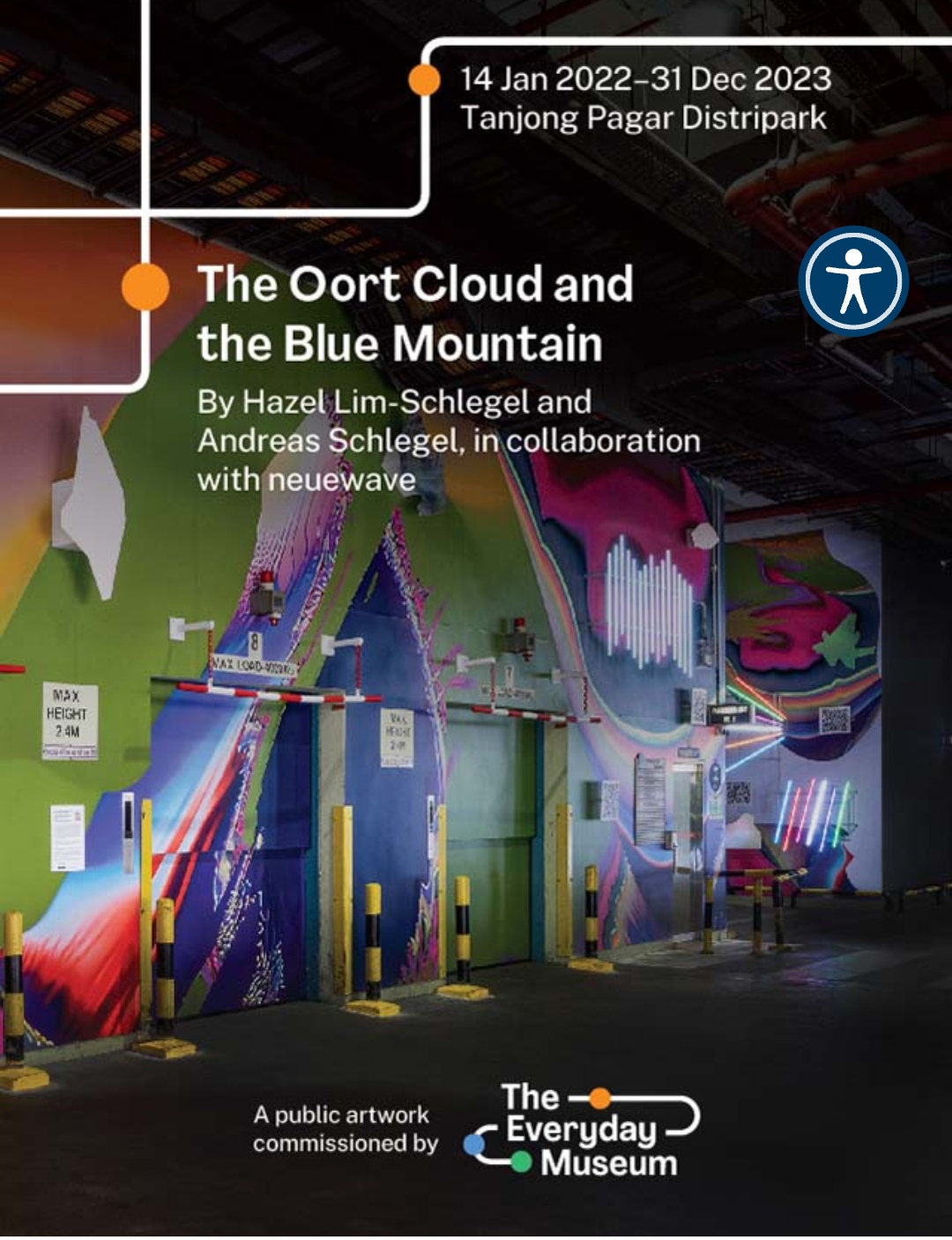The Oort Cloud and the Blue Mountain: Edition Tanjong Pagar Distripark (2022) is an installation work by Hazel Lim-Schlegel and Andreas Schlegel, in collaboration with neuewave. It refers both to Blue Mountain, an early 20th century painting by Wassily Kandinsky and the Oort Cloud, an astronomical phenomenon described as an extended shell of icy objects that exist on the outer reaches of our solar system. The distant Oort Cloud, out of reach to our capacity to experience, is the opposite of tangibility and perceptibility which the Blue Mountain represents. The work thus refers to the broader idea of senses and/or the limit of sensing, that some things can be tangible and sensed but remain distant from our comprehension.
The installation is also a reflection of the increasingly digitalised world where technology has become a key mediator of human experiences – the large-scale vinyl print of an abstract image of the Blue Mountain is generated by a computer program, animated by a series of light fixtures; a set of QR codes further extend the physical experience of the work into a virtual space. Visitors are invited to scan the QR codes for 3D micro-experiences through which they can explore and interact with the relief objects as well as capture and share their experience through the use of selfies. The digital content will be refreshed quarterly by other local artists invited by the Schlegels. This, and other potential activations, not only offer viewers new encounters with the work but also open it up to an organic and evolving process of improvisation and adaptations.
The Oort Cloud and the Blue Mountain: Edition Tanjong Pagar Distripark is commissioned with the support of Mapletree and is part of The Everyday Museum, a public art initiative by Singapore Art Museum. The first edition of the work was commissioned by the National Gallery Singapore for The Children’s Biennale 2019.
The installation is also a reflection of the increasingly digitalised world where technology has become a key mediator of human experiences – the large-scale vinyl print of an abstract image of the Blue Mountain is generated by a computer program, animated by a series of light fixtures; a set of QR codes further extend the physical experience of the work into a virtual space. Visitors are invited to scan the QR codes for 3D micro-experiences through which they can explore and interact with the relief objects as well as capture and share their experience through the use of selfies. The digital content will be refreshed quarterly by other local artists invited by the Schlegels. This, and other potential activations, not only offer viewers new encounters with the work but also open it up to an organic and evolving process of improvisation and adaptations.
The Oort Cloud and the Blue Mountain: Edition Tanjong Pagar Distripark is commissioned with the support of Mapletree and is part of The Everyday Museum, a public art initiative by Singapore Art Museum. The first edition of the work was commissioned by the National Gallery Singapore for The Children’s Biennale 2019.
Hazel Lim-Schlegel (b. 1975) is a visual artist with a background in painting and employs text, crafting methods and drawings to articulate her interests in the production of narratives, notions of displacement, construction of histories and imaginary landscapes. The artist's research inquiries delve into aspects of painting and utilises text, paper folding and participation with audiences. In Lim-Schlegel’s current research on the Aesthetics of Care and through involvement in the Craft Council of Singapore, the artist is employing crafting techniques such as needlework and paper craft to investigate the utility of diagrams, image making and colour theory, at the same time, interrogating the relationship of craft to the domestic and feminine.
Andreas Schlegel (b.1975) works across disciplines and creates objects, tools and interfaces where art and technology meet in a curious way. Many of the artist’s works are collaborative and have been presented on screen, in code, as installation, workshop or performance. Schlegel’s practice focuses on contemporary and open-source technologies, where outcomes are informed by computation, interaction and networked processes.
Schlegel’s individual and collaborative works are diverse in nature and presentation. They have been shown in contemporary art spaces such as the ArtScience Museum, National Gallery and the Institute of Contemporary Arts, LASALLE in Singapore, Museum of Contemporary Art Belgrade, Groninger Museum in the Netherlands, Tainan Art Museum in Taiwan or the Total Museum of Contemporary Art in Seoul. The artist has presented works at conferences including ISEA, SIGGRAPH Asia and Resonate. Currently, Schlegel is a Senior Lecturer in the School of Design Communication at LASALLE College of the Arts where the artist teaches across disciplines. Schlegel’s work at the college’s Media Lab is practice-based, collaborative and interdisciplinary and aims to blur the boundaries between art and technology.
Andreas Schlegel (b.1975) works across disciplines and creates objects, tools and interfaces where art and technology meet in a curious way. Many of the artist’s works are collaborative and have been presented on screen, in code, as installation, workshop or performance. Schlegel’s practice focuses on contemporary and open-source technologies, where outcomes are informed by computation, interaction and networked processes.
Schlegel’s individual and collaborative works are diverse in nature and presentation. They have been shown in contemporary art spaces such as the ArtScience Museum, National Gallery and the Institute of Contemporary Arts, LASALLE in Singapore, Museum of Contemporary Art Belgrade, Groninger Museum in the Netherlands, Tainan Art Museum in Taiwan or the Total Museum of Contemporary Art in Seoul. The artist has presented works at conferences including ISEA, SIGGRAPH Asia and Resonate. Currently, Schlegel is a Senior Lecturer in the School of Design Communication at LASALLE College of the Arts where the artist teaches across disciplines. Schlegel’s work at the college’s Media Lab is practice-based, collaborative and interdisciplinary and aims to blur the boundaries between art and technology.
